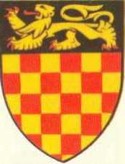Snyder Family 2016 - Person Sheet
Spouses
Birth849, Wantage, Berkshire, England
Death25 Oct 899, England
Death Memoage 50
BurialHyde Abbey, Winchester
FatherÆthelwulf King of Wessex (~795-858)
MotherOsburh Queen of Wessex
Marriage868
Notes for Ealhswith of Mercia , Queen Of England
Married 868, Winchester, England to , Ealhswith of the Gaini
Child 1: , AEthelflaed, Lady of Mercia, b. CIR 869
Child 2: , Edmund, b. ABT 870
Child 3: , Edward the Elder, King of England, b. 869
Child 4: , AEfthryth
Child 5: , AEthelgeofu of Shaftesbury, Abbess of Shaftesbury
Child 6: , AEthelweard, b. 880
AKA: Ealhswith Of Mercia
Child 1: , AEthelflaed, Lady of Mercia, b. CIR 869
Child 2: , Edmund, b. ABT 870
Child 3: , Edward the Elder, King of England, b. 869
Child 4: , AEfthryth
Child 5: , AEthelgeofu of Shaftesbury, Abbess of Shaftesbury
Child 6: , AEthelweard, b. 880
AKA: Ealhswith Of Mercia
Notes for Ælfred (Alfred) "The Great" (Spouse 1)
Alfred The Great, King Of Wessex [Note: Ethel (also æthel) is an Old English word meaning "noble"]
b. 0849
d. 0899, Age: 50
ALFRED, the Great (871-900 AD)
Youngest son of King Æthelwulf, Alfred became King of Wessex during a time of constant Viking attack. He was driven into hiding by a Viking raid into Wessex, led by the Dane, Guthorm, and took refuge in the Athelney marshes in Somerset. There, he recovered sufficient strength to be able to defeat the Danes decisively at the Battle of Eddington. As a condition of the peace treaty which followed, Guthorm received Christian baptism and withdrew his forces from Wessex, with Alfred recognizing the Danish control over East Anglia and parts of Mercia. This partition of England, called the "Danelaw", was formalized by another treaty in 886.
Alfred created a series of fortifications to surround his kingdom and provide needed security from invasion. The Anglo-Saxon word for these forts, "burhs", has come down to us in the common place-name suffix, "bury." He also constructed a fleet of ships to augment his other defenses, and in so doing became known as the "Father of the English Navy." The reign of Alfred was known for more than military success. He was a codifier of law, a promoter of education and a supporter of the arts. He, himself, was a scholar and translated Latin books into the Anglo-Saxon tongue. The definitive contemporary work on Alfred's life is an unfinished account in Latin by Asser, a Welshman, bishop of Sherbourne and Alfred's counsellor. After his death, he was buried in his capital city of Winchester, and is the only English monarch in history to carry the title, "the Great."
b. 0849
d. 0899, Age: 50
ALFRED, the Great (871-900 AD)
Youngest son of King Æthelwulf, Alfred became King of Wessex during a time of constant Viking attack. He was driven into hiding by a Viking raid into Wessex, led by the Dane, Guthorm, and took refuge in the Athelney marshes in Somerset. There, he recovered sufficient strength to be able to defeat the Danes decisively at the Battle of Eddington. As a condition of the peace treaty which followed, Guthorm received Christian baptism and withdrew his forces from Wessex, with Alfred recognizing the Danish control over East Anglia and parts of Mercia. This partition of England, called the "Danelaw", was formalized by another treaty in 886.
Alfred created a series of fortifications to surround his kingdom and provide needed security from invasion. The Anglo-Saxon word for these forts, "burhs", has come down to us in the common place-name suffix, "bury." He also constructed a fleet of ships to augment his other defenses, and in so doing became known as the "Father of the English Navy." The reign of Alfred was known for more than military success. He was a codifier of law, a promoter of education and a supporter of the arts. He, himself, was a scholar and translated Latin books into the Anglo-Saxon tongue. The definitive contemporary work on Alfred's life is an unfinished account in Latin by Asser, a Welshman, bishop of Sherbourne and Alfred's counsellor. After his death, he was buried in his capital city of Winchester, and is the only English monarch in history to carry the title, "the Great."



